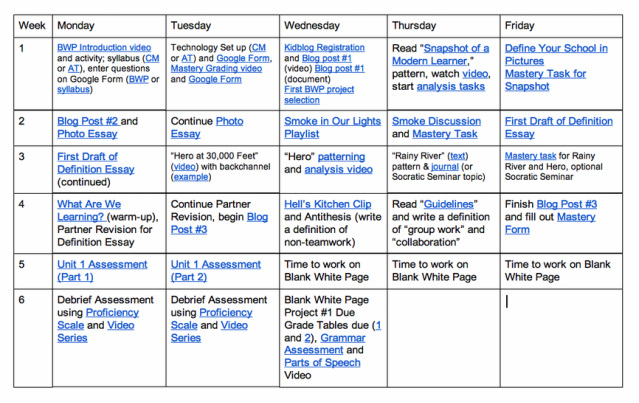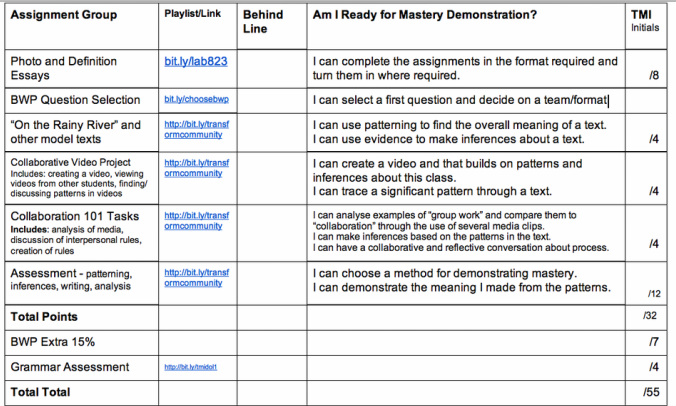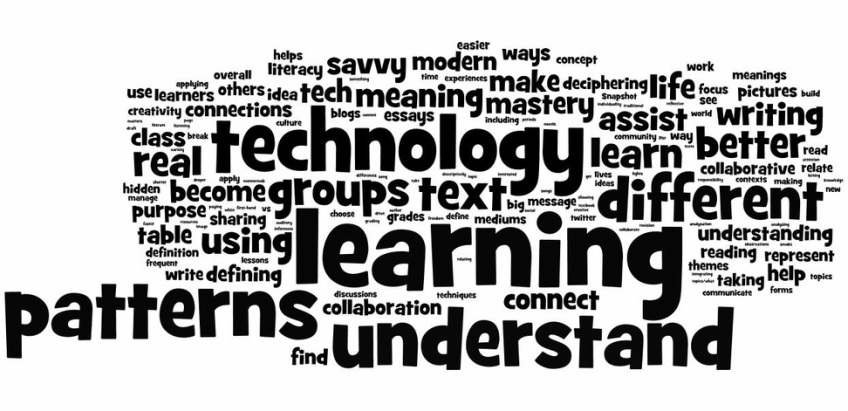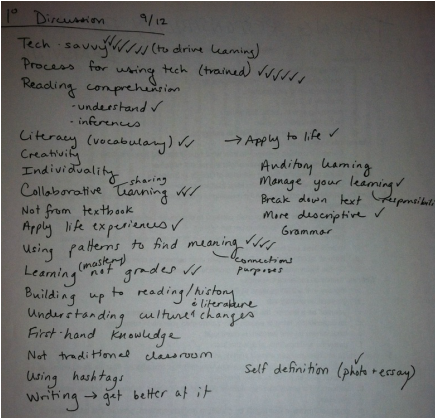However, I've had to come to the realisation that being student-centred is about doing what the students need for where they are in their education and with the content knowledge and academic habits they bring with them. So sometimes that looks like me being at the "front" (there is no front in my classroom) and everyone engaged in a synchronous activity. In fact, that's what it looks like most of the time right now.
For both years Andrew and I have team-taught, we started running several minutes before even hitting the ground. We planned to throw our students into the deep end, and then hope that they could swim as well as we wanted them to. And yeah, that failed. Shocking, I know.
After only a few days (it took six weeks last time), we saw that we needed to take a few steps back and build their skills before expecting them to take ownership over their learning in any meaningful way. Since that's the ultimate goal of any class we teach, it was important enough to change enough that we could get it right.
We were already planning the first unit (for me, the entire first trimester) to be about the brain, how teenagers think, feel, and learn, and to centre around the novel Looking for Alaska, by John Green. So we started thinking about the skills and knowledge they would need in order to start taking responsibility for their learning. The short (and nowhere near comprehensive) list came down to:
- Taking notes, both as annotations while reading and while taking in information from a video or in class
- Collaborating and having academic conversations with peers
- Establishing a procedure for writing fluency - writing without stopping or talking for 3-10 mins
- The basics of patterning - finding patterns in a text, categorising those patterns, and starting to find meaning
- Using information from sources accurately and effectively
- How to work productively and independently for a short amount of time without disrupting others
- Using technology essential to the course - Google Drive, MentorMob, YouTube, Gmail, Blogger
- What it means to work to mastery, rather than just for completion
We gave ourselves the first trimester or so to teach and assess those skills.
As we started to plan out the unit, we thought about what content we should use for this unit. Other than Looking for Alaska, we didn't want to use fiction, either short or long-form, or poetry (or at least not predominantly). So we decided to focus on two things:
- How the teenage brain operates, and how it learns
- What the purpose of school is, and how our understanding and decision-making is (or should be) influenced by brain development
Everything is leading toward the project students are undertaking that centres around this question:
What is the purpose of a high school, and what can we do to implement one change at our school to make it fit that purpose better?
That question will guide all of our study. If you want to see what this looks like, here is the MentorMob playlist that has all the videos we're using (we do a video every day at the start of class to get students in their seats on time and focused, and also to give them something to write about if they need a topic for their daily writing warm-up. We also have used lots of TED Talks about education and the teen brain) and many of the assignments we've created to lead them towards thinking about education and their place in their school community. I've also started getting in the habit of taking a picture of anything I write, whether it's on the board or my own personal notes about something. I post these for my students, and many of the steps on the playlist are the notes/instructions that I've modelled and made available for all students.
As with all our curriculum, please take what works for you and use it. We do ask that you credit us if you take something exactly as-is. We also acknowledge that NONE of this would be possible without having TED Talks available for free online, and without the work of many of our colleagues, particularly Karl Lindgren-Streicher, who did a version of the "What would you do to make a positive change at our school" project. We are blessed to have such amazing people share so freely with us, and we'd like to extend the same offer to all of you.






 RSS Feed
RSS Feed
